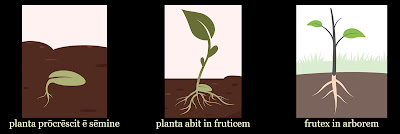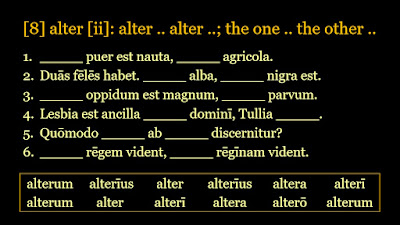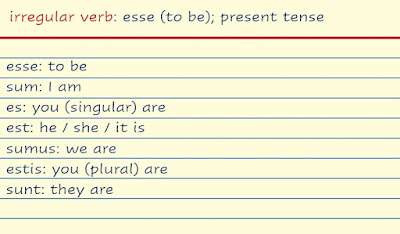Medius erat mēnsis
September cum patruus meus haec dē Britanniā Rōmānā explicāvit. Mārcus et
Alexander tum aderant: nam prīdiē Dubrīs adventāverant et apud nōs
pernoctāverant. Et patruō meō necesse erat eīs dē rebelliōne Galgācī et
Calēdonum narrāre. Nam historiā patriae suae magnopere dēlectantur. Tum ille
"Nōnne rēctē" inquit "Agricola ā Tacitō laudātur? Nam ab aliīs
imperātōribus Rōmānīs oppida expugnābantur, agrī vastābantur, nātiōnēs barbarae
dēbellābantur; sed Agricola Britannōs nōn sōlum dēbellāvit sed etiam ad vītam
hūmāniōrem revocāvit."
Et Alexander
"Magnopere dēlector" inquit "sī victor iūstus et clēmēns fuit.
Sed num hic vir omnia illa aedificia Rōmāna aedificāvit?" Et ille
"Britannia per quattuor saecula aedificiīs Rōmānīs ōrnābātur. Multae ex
illīs reliquiīs posteriōris aetātis sunt."
Tum Mārcus
"Num fīliī prīncipum Britannicōrum studiō linguae Latīnae dēlectābantur?"
inquit.
Et ille
"Fīliī Britannōrum antīquōrum animō ācrī et impigrō erant; linguae Latīnae
libenter operam dabant. Agricola eōs aptiōrēs esse ad studia litterārum
affirmābat quam Gallōrum puerōs. Et Mārtiālis, poēta Rōmānus illīus aetātis,
Britannōs carmina sua cantāvisse affirmat. Vōs hodiernī pilā et folle dēlectāminī.
Et ego "Nōnne
tū ipse, patrue mī patruissime, corporis certāminibus dēlectāris? Magna est
scientia pilam dextrā laevāque captāre."
Et ille
"Adulēscentulus" inquit "illā scientiā satis dēlectābar; cum
senex fuerō, fortasse nōn dēlectābor."
Nōs cachinnāmus.
Nam patruus meus lūdō trigōnālī magnopere dēlectātur. Tū, mī patrue, huius lūdī
perītissimus es:
Nec tibi mōbilitās
minor est, sī forte volantem
Aut gemināre pilam
iuvat aut revocāre cadentem...
Laus Pisonis
I.185-186
ut est apud poētam
Rōmānum. Mūtātō nōmine dē tē, patrue, fābula narrātur.
https://penelope.uchicago.edu/Thayer/E/Roman/Texts/Laus_Pisonis/text*.html#178
Notes:
[1] patruus meus lūdō
trigōnālī magnopere dēlectātur
lūdus, -ī [2/m] or
lūsus, -ūs [4/m] trīgōnālis
trīgōnālis, -e:
adjective referring to trigōn, -is [3/m] from Ancient Greek τρίγων
[trígōn] or τρίγωνον [trígōnon: triangle]; trīgōn was a Roman ball game
which involved three people (hence trīgōn) in a triangle; the word could
also mean the small ball used in the game:
Fugiō campum, lūsumque
trigōnem. (Horace) │ I avoid the Campus (Martius) i.e. the
Field of Mars and the game of hand-ball.
https://en.wikipedia.org/wiki/Trigon_(game)
[2]
[a] Agricola ¦
[i] eōs aptiōrēs [ii] esse ad studia litterārum affirmābat
quam Gallōrum puerōs.
[b] Et Mārtiālis
… ¦ [i] Britannōs carmina sua [ii] cantāvisse affirmat.
Both of these are
examples of indirect statement:
[a] Agricola …
affirmabat … │ Agricola stated …
[b] Mārtiālis …
affirmat … │ Martial states …
In English an
indirect statement is introduced by the conjunction that e.g. he stated that
…
In Latin an
indirect statement is conveyed by [i] the subject of the indirect statement in
the accusative case and [ii] the verb of the indirect statement as an
infinitive:
[a] Agricola ¦
[i] eōs aptiōrēs [ii] esse ad studia litterārum affirmābat quam
Gallōrum puerōs.
Literally:
Agricola stated [i] them [ii] to be more suited to the study of
letters than the sons of the Gauls.
> Agricola stated
¦ that [i] they [ii] were more suited …
[b] Et Mārtiālis … ¦ [i] Britannōs carmina
sua [ii] cantāvisse affirmat.
In this sentence
we see a perfect active infinitive meaning ‘to have sung’
[i] Take the 3rd
principal part i.e. the perfect tense: cantō, -āre, cantāvī [1]: sing
[ii] remove the -ī
ending: cantāv-
[iii] add -isse:
cantāvisse │ to have sung
Literally: Martial
states [i] the Britons [ii] to have sung their own songs.
> Martial states
¦ that [i] the Britons [ii] sang …
Indirect
statements are a lengthy topic and the topic is soon to be discussed in detail.
However, it is referred to here:
https://adckl.blogspot.com/2025/02/070225-speaking-latin-on-campus_30.html
https://adckl.blogspot.com/2025/03/020625-level-3-sonnenschein-pro-patria.html
[3]
Nec tibi mōbilitās
minor est, ¦ sī forte volantem / Aut [ii] gemināre pilam [i] iuvat
¦ aut [iii] revocāre cadentem...
No less is your
nimbleness, ¦ if perhaps [i] it is your pleasure either [ii] to return
the flying ball ¦ or [iii] recover (it) (when) falling
…
Exercises
This passage provides
some review of the passive voice which was discussed in over thirty posts, all
of which are available here:
https://mega.nz/file/rYkjzCgC#gfnqLlfHt23oFmHeGZyWaNsmtbXQag9Tkwm4rcXJZPs
[1] Present
passive; find the Latin:
[i] I am really
pleased [literally: I am greatly delighted]
[ii] you (sg.)
take pleasure in / enjoy athletics [literally: you are delighted
by contests of the body]
[iii] the tale is
told (about you)
[iv] my uncle
greatly enjoys a (hand-) ball game [literally: … is delighted by …]
[v] you boys
nowadays take pleasure in / enjoy … [literally: you boys of today are
delighted …]
[vi] they take
interest in history [literally: they are delighted ¦ by history]
[vii] under a
different name [literally: with a changed name i.e. a name that has
been changed]
[2] Imperfect
passive; find the Latin:
[i] Fields were
laid waste [devastated]
[ii] Nations were
defeated.
[3] passive agent;
ablative of means instrument
How is by
conveyed in these two sentences in the Latin text? Why is it conveyed
differently in each one?
[i] Surely
Agricola is justly praised ¦ by Tacitus?
[ii] Britain was
decorated ¦ by / with Roman buildings
Translate:
[i] ab
aliīs imperātōribus Rōmānīs oppida expugnābantur
[ii] Num fīliī
prīncipum Britannicōrum studiō linguae Latīnae dēlectābantur?
https://adckl.blogspot.com/2025/02/240525-level-3-summary-of-of-uses-of_26.html
https://adckl.blogspot.com/2025/02/240525-level-3-summary-of-of-uses-of.html
[4] Here is a less
literal translation of one of the sentences in the text. Find the Latin
original and compare them:
As a young man I
was happy enough with knowing that; when I’m an old man perhaps I won’t take
pleasure in it.



































